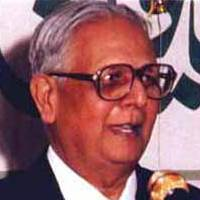
Kali Das Gupta 'Raza'
Dr.Mazhar
Naqvi
Kali
Das Gupta Raza is acclaimed as an authority on Mirza Ghalib. But his work on Azadari
traditions remains less known or forgotten. Even marsiyas composed by him are
not easily available despite its publication under the title ’Shaoor-e-Gham”. Born
in 1925, Kalidas Gupta was a great devotee of Imam Raza (Rida).Out of his sheer
love for 8th Imam, he chose Raza as his pen name and worked ceaselessly
in exploring marsiya writing by Hindus on the tragic events of Karbala. He
immersed himself so deeply in unearthing Hindu marsiya writers to become an
authority on the history of Deccan also. He traced the origin of marsiya
writing from the period of Qutb Shahi dynasty of Golconda.
In his
endeavor to collect material on the contribution of Hindus to the promotion of
Hussaini literature, Gupta unearthed several authors whose work never came to
limelight for two reasons –First, the non-availability of their compositions
and second, the indifference of even most distinguished Imami scholars towards elegiac
poetry produced on Karbala by non-Muslims. Gupta had given the names of such
writers in his collection published under the title ’Sahv-o-Suragh’. Unfortunately,
this book too is not available easily in the market. It indicates that there
has been no second edition of the book or the due importance has not been given
to the historical significance of Gupta’s work.
The
credit for tracing the first Hindu Marsiya writer of India also rests with Gupta.
His work reveals that Ram Rao of Gulbarga composed elegiac poetry with pen name
‘Saiva’ in Deccan for the first time. When Ali Adil Shah ascended the throne of
Bijapur, Ram Rao left Gulbarga and settled in the dominions of Adil Shahi kingdom.
Apart from composing elegiac poetry, Ram Rao also translated ‘Rozatush Shuhadda’in
Deccani verse. The importance of this work can be gauged from the fact that its first Urdu translation under
the title ‘ Karbal Katha’ had taken place in 17th century.
Makkhan Das, Balaji Tasambak’ ‘Tara’, Swami Prasad ‘Asghar’ and several other Hindu poets also figure in Gupta’s
research work .They all composed elegiac poetry on Karbala in very lucid style
and popularized marsiyas among the Deccani people. Of the trio, Asghar wrote
marsiyas in Deccani style of Urdu but composed his other poetry in Persian and Hindi.
It is indeed unfortunate that research carried out by Gupta is never discussed nor
any seminar is ever organized by lovers of Ahle-Bait on the contribution of
non-Muslims in propagation of Azadari. Gupta surely deserves more attention
,for he didn’t undertake research work for any worldly gains but simply did it
to shoe his unconditional love for Masoomeen in view of their simple living, high
thinking and love for all, irrespective of their caste, creed of religion. Their
only mission was to serve humanity and it charmed not only Gupta but hundreds
of other non-Muslims as well. Over 14 years have passed since Gupta passed away
in 2015, leaving behind a treasure on Karbala literature but his soul is still
awaiting someone to rise and make his contribution known to the literary world
not as an authority on ‘Ghalib’ but an ardent admirer of ‘Shah-e-Khorasan’ Imam
Raza .By focusing on the research of Gupta
justice can be done to those Hindu poets who were discovered by them but their poetry
on martyrs of KARBLA remains forgotten, unpublished or non-translated till date.(References available on request.)
Salaam,
ReplyDeleteI am writing a small book in English on the pluralistic spiritual poetry of the Indian subcontinent. Apart from other things, it will also cover some of the non-Muslim marsiya writers of India. Unfortunately I am not able to get much on the internet or libraries. Could you please share some of these marsiyas with me. This book is not a commercial venture and is self-funded.
Please correct the word it's imam bargha not (baaras) baaras term is use for animals where you put them for farming if you thing that I am correct so for imam as its (bargha)the place of imam as where he stay
ReplyDeleteunka darr mere sar jhuka hae jab sae mere sir dar-e-bargahae imam per naa jhukanae ki zarurat mujae kis or darr prr
Has Raza written any Gazals himself? Please give details of what where I can find these? Prem S R
ReplyDelete